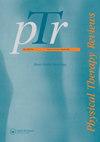Effects of mechanical insufflator-exsufflator in people with spinal cord injury: a systematic review
IF 0.8
Q4 REHABILITATION
引用次数: 0
Abstract
Abstract Background: The mechanical insufflator-exsufflator (MI-E) is a medical device designed to augment the cough mechanism and could be an important add-on in the management of people with spinal cord injury (SCI), in whom ineffective cough is one of the major causes of respiratory complications. Objectives: To search and analyze the effects reported in the literature about the utilization of the MI-E in people with SCI. Methods: An electronic search was carried out in five databases seeking studies that researched the application of MI-E in adult patients with SCI. Results: Eight studies with fair (N = 5) to good (N = 3) methodological quality were included. Significant improvements were reported in peak cough flow, vital capacity, forced vital capacity, forced expiratory volume in the first second, and forced mid-expiratory flow, without any major adverse effects. The studies also reported that MI-E improved bronchial clearance, facilitated the ventilator weaning process, and helped to achieve normative values of peripheral oxygen saturation. Furthermore, participants reported high levels of satisfaction with MI-E. Conclusions: This systematic review shows that there is a lack of studies on the researched topic, especially of good-quality randomized trials. However, the present state of evidence also showed encouraging results in the use of the MI-E device in people with SCI.机械充气-呼气机在脊髓损伤患者中的作用:一项系统综述
背景:机械吸气-呼气器(MI-E)是一种旨在增强咳嗽机制的医疗设备,可以成为脊髓损伤(SCI)患者治疗的重要补充,在脊髓损伤中,无效咳嗽是呼吸道并发症的主要原因之一。目的:检索和分析文献报道的SCI患者使用MI-E的效果。方法:电子检索5个数据库,寻找MI-E在成年SCI患者中的应用研究。结果:纳入了8项方法学质量一般(N = 5)至良好(N = 3)的研究。据报道,咳嗽峰值流量、肺活量、用力肺活量、第一秒用力呼气量和用力呼气中流量均有显著改善,无任何主要不良反应。研究还报道,MI-E改善支气管清除率,促进呼吸机脱机过程,并有助于达到外周氧饱和度的正常值。此外,参与者报告了对MI-E的高满意度。结论:本系统综述显示,该研究课题缺乏相关研究,特别是缺乏高质量的随机试验。然而,目前的证据也显示了在脊髓损伤患者中使用MI-E装置的令人鼓舞的结果。
本文章由计算机程序翻译,如有差异,请以英文原文为准。
求助全文
约1分钟内获得全文
求助全文
来源期刊

Physical Therapy Reviews
REHABILITATION-
CiteScore
1.30
自引率
0.00%
发文量
26
期刊介绍:
Physical Therapy Reviews is an international journal which aims to publish contemporary reviews, discussion papers and editorials within physical therapy, and in those basic and clinical sciences which are the basis of physical therapy. The journal is aimed at all those involved in research, teaching and practice within the area of physical therapy. Reviews (both descriptive and systematic) are invited in the following areas, which reflect the breadth and diversity of practice within physical therapy: •neurological rehabilitation •movement and exercise •orthopaedics and rheumatology •manual therapy and massage •sports medicine •measurement •chest physiotherapy •electrotherapeutics •obstetrics and gynaecology •complementary therapies •professional issues •musculoskeletal rehabilitation
 求助内容:
求助内容: 应助结果提醒方式:
应助结果提醒方式:


